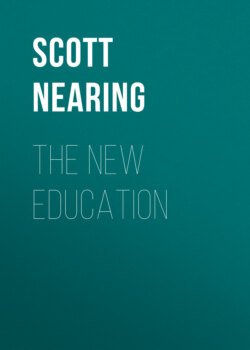Читать книгу The New Education - Scott Nearing - Страница 29
На сайте Литреса книга снята с продажи.
VII The Vicious Practices of One “Good” School
ОглавлениеThere are school systems in which organization has overgrown child welfare, in which pedagogy has usurped the place of teaching. In such systems the teacher teaches the prescribed course of study, whether or no. The officers of administration, aiming at some mechanical ideal, shape the schools to meet the requirements of system.
The proneness of some teachers and school administrators alike to overemphasize mechanics, and to underemphasize the welfare of individual children is well illustrated in a recent statement by Dr. W. E. Chancellor, who, in writing of a first-hand investigation made in a city in the Northeast, describes a condition which he says “I know by fairly authoritative reports does exist in a considerable number of cities and towns—not merely in a school here and there, but generally and characteristically.
“In the city to which I definitely refer,” Dr. Chancellor continues, “I found that the intermediate and grammar grade teachers had systematically, deliberately, and successfully sacrificed hundreds of boys and girls upon the altar of examinations to the fetish of good schools. They have been so anxious to have good schools that they have kept an average of 20 per cent of their pupils one grade lower than they belong. In some schools the average runs to above 35 per cent.
“Some teachers and some school superintendents cannot see that the school is simply a machine for developing boys and girls; cannot see that the machine in itself is worthless save as it contributes to human welfare. A school may be so good as actually to damage the souls and bodies of human beings. It damages their souls when the machine operators, seeking 75 per cent in every subject, keep boys and girls in grammar schools until they average sixteen years of age.”[19] Dr. Chancellor continues with a stinging arraignment of school officials who sacrifice children to systems.
The article strikes an answering chord in the experiences of many men and women. A friend came recently to our bungalow, and, with a troubled face, spoke of his daughter’s ill-health.
“She is not sick,” he said, “but just ailing. These first May days have taken her appetite. She needs the country air.”
The daughter was a dear little girl of twelve—any one might have envied the father of his treasure—and we offered to keep her with us for a month in the country, and to go over her school work with her every day. The father accepted our proposal on the spot, but two days later he came back to say that he could not make the arrangements.
“It cannot be done,” he explained, “because the school will not let her off. I told the principal about my daughter’s health and showed him the advantage of a month in the country with her school work carefully supervised. Her school is rather crowded, and as I want her to go on with her class in the autumn, I asked him if he could arrange to keep her place for her. In reply he said—
“ ‘I cannot do as you wish. Such cases as yours interfere seriously with the working of the school.’ ”
